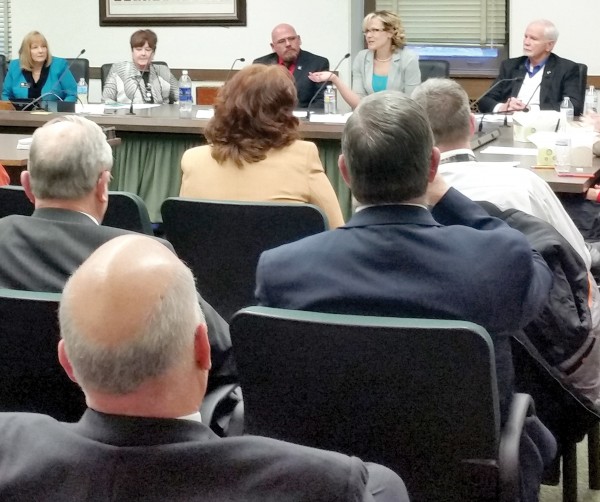
Duane France and Tami Clark speak to a gathering of legislators and guests
In January of 2016, I had the privilege of speaking at the Colorado State Capitol Building. Several state lawmakers have started the first ever Veterans Caucus at the Colorado General Assembly, with the goal of gathering together legislators from both sides of the aisles to learn about veteran issues in Colorado.
Veteran Mental Health issues were the first topic to be presented to the Veterans Caucus. In a huge success for the initial meeting, over 65 lawmakers, staffers, veteran advocates, and community members met to learn about what mental health issues veterans face.
The primary message that was presented is that awareness is the key to healing and recovery. Awareness on the part of the veteran themselves, awareness on the part of the veteran’s support network, and awareness on the part of the community.
The veteran themselves must become self-aware. We need to develop awareness that we are having difficulty adjusting to the transition from combat to garrison, difficulty adjusting to the transition from the military to civilian life. Second, we must develop awareness that there is nothing wrong with that difficulty…it is 100% normal, and even to be expected. Veterans also need to be aware that there are resources that can help them manage those difficulties, and that those resources actually work.
The veteran’s support network also needs to be aware of the change that has occurred. The support network includes immediate family, such as spouse, children, parents, and siblings, as well as extended family and the veteran’s social network…classmates, coworkers, friends. The people in these support networks need to be aware that the veteran they know is different from the veteran they knew…deployed or not, witnessed combat or not, struggling or not. When someone joins the military, they immerse themselves into a different culture. This is a lifestyle change, one that comes with it’s own language, expected standards of conduct, and both written and unwritten rules. Once someone assimiliates into that culture, grows to appreciate and even “love” it, then they are exposed to traumatic events, they are forever and irrevocably changed. I didn’t say “broken” or “damaged” or “screwed up”…they are changed. We grow, we mature, daily we become the sum total of our experience in our life up to that point. Many in a veteran’s support network want the veteran to be the “way they were”, rather than accept how they are.
Finally, the community must become aware that this change occurs, in individual veterans themselves and in the population of veterans as a whole. The community needs to understand that the concept of “crazy combat vet” is not an image that veterans relish; not every veteran is John Rambo in First Blood, walking through life in a haze of flashbacks getting ready to lob pine cones as if they were hand grenades. Veterans want what everyone else wants; the opportunity to live a life worth living. To participate in meaningful work. To take care and protect the ones they love. To continue to serve their community, but in their own way, and at their own pace. As a community, supporting a veteran takes the awareness that the image of “veteran” is more than just some anxiety-ridden, flashback-enduring hollow shell of a person. Enough veterans see themselves in this way…getting that image confirmed when they look in someone’s eye just solidifies their image of themselves.
In this blog, I’ll be expanding on a few of the points that I presented to the Veterans Caucus. I’ll talk about what PTSD is, and what it isn’t; I’ll talk about the mental health of veterans who may not meet the diagnosable criteria for PTSD but are still struggling; and I’ll talk about wellness versus illness, and how veterans can achieve this wellness. Please follow along, join the conversation by commenting on this post, and forward this post to your network. Together, we can help veterans help themselves to find a place of stability…which is what each of us wants in our lives.




3 Comments
Success or Struggle in Transition Can Depend on Mental Health | Veteran Mental Health · July 6, 2016 at 1:08 pm
[…] previous posts, I’ve talked about how awareness is the key to recovery for veterans, I’ve joined with others talking about what PTSD is and what it isn’t, and I’ve […]
The Dangers of an Offensive Defense | Head Space and Timing · March 22, 2017 at 5:39 am
[…] with just about anything else about ourselves, it starts with personal awareness. I may not be fully aware of how abrasive I can be, or how I’ve put up a bristling defense in […]
Injury of the Soul: Moral Injury and Combat Vets — Head Space and Timing · August 10, 2017 at 7:29 am
[…] combat and home life is due to the violence of action paradox. These posts were intended to help raise the awareness of veteran mental health, for the veteran and everyone involved in a veteran’s life. While PTSD and Traumatic Brain Injury […]
Comments are closed.